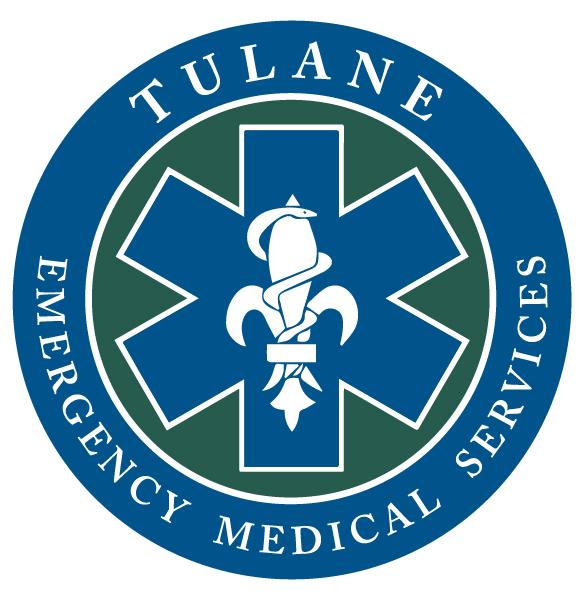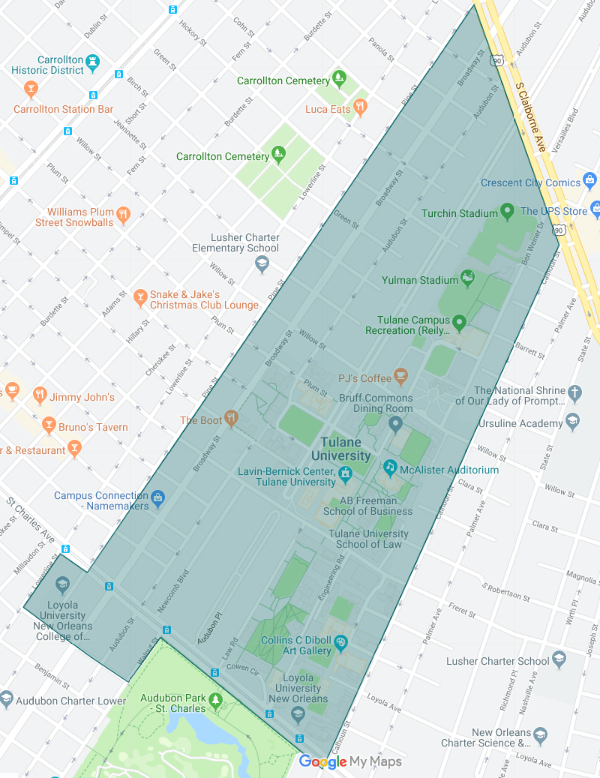Uptown Campus: 504-865-5911 (Ext. 55911)
Off Campus: 911

Tulane EMS is a fully licensed ground transport ambulance service that does not bill for usage. When you call, an ambulance will respond, with lights and sirens, along with two to four crew members. The crew may be comprised of a variety of positions, from EMT students to EMS Supervisors with several years of experience. Tulane EMS does not bill for service.
Additionally, Tulane EMS has the ability to activate New Orleans Fire Department and EMS. It is our goal that patients receive the highest quality of care and attention with the lowest response time. Often, that means working with municipal 911 system.
TEMS Frequently Asked Questions
Hours of Operation
Tulane EMS operates 24 hours / 7 days a week during the fall and spring semesters, except when the University is closed for student breaks and holidays.
Service Area
Tulane EMS primarily operates on the Uptown campus, bordered by S. Claiborne and St. Charles avenues, and Pine and Calhoun streets. Within these boundaries, Tulane EMS handles all calls to 911 for medical aid.
On a small number of occasions, Tulane EMS will respond to calls slightly outside of these boundaries in coordination with New Orleans EMS during periods of high volume (ex: Mardi Gras). This allows Tulane EMS to provide free-of-charge care to the surrounding Tulane community and provides valuable experience to Tulane EMS members.
When to Call for Help
NOTE: This list is not all-inclusive. If in doubt, it is always better to call!
- Chest pain
- Difficulty breathing
- Severe bleeding
- High fever
- Disorientation
- Uncontrollable vomiting
- Loss of consciousness
- Head injury
- Orthopedic injuries (sprains, strains, breaks, fractures, or dislocations)
What happens when I call?
When you call, the police dispatcher will ask what your emergency is. Give the dispatcher the necessary information and answer any questions.
The dispatchers will ask you to provide:
- Exact location or address of the emergency. Include nearby intersections, landmarks, and building name with floor, and room or apartment number.
- The telephone number from which the call is being made (if it is an on-campus number, they will have the extension).
- The caller's name
- What happened – for example, a motor vehicle collision, fire, or fall
- How many people are involved
- The condition of the victim(s) – for example, unconsciousness, chest pains, or severe bleeding
- What help (first aid) is being given
IMPORTANT: Do NOT hang up until the dispatcher hangs up. They may have important instructions to relay to you.
After you hang up, return to the victim or wait at the stated location for university police and emergency responders to arrive. They will directly contact Tulane EMS and provide up-to-date and exact information on both the patient and the location.
After You Call
After you call, the police dispatcher pages Tulane EMS. The crew is quickly assembled and responds based on the call location, their present location, and severity of the call. When the first crew member arrives on the scene, they will quickly assess the severity of the patient's condition. Common questions asked of the patient are those to assess their level of orientation and alertness ("What is your name? Do you know where you are, what today is, and what happened?"). Others include checking for common symptoms of life threats, such as the presence of chest pain, shortness of breath, a fall or hit to the head.
If you are the patient or a bystander to a call, remain calm and let the crew work. Don't crowd the patient or the crew. If a crew member asks you to step back, please do so. Interfering with the work of an EMT while on a call is an offense punishable by law. Those who interfere may be arrested.
BE AWARE! Bystanders or witnesses can provide valuable information to the EMTs on scene. Try to remember exactly what happened. Some details you may think are minor can be very important. Try to recall:
- Was the patient or victim noticeably ill, in pain, or sick?
- Does the patient have any preexisting medical conditions or are they on any medications?
- If the person had a seizure or convulsions, was the entire body shaking or just one part?
- Did they fall or hit their head?
If You or Someone You Know is Being Transported to the Hospital
Make sure the patient has their identification, insurance cards, and other necessary personal information. This information is important for the hospital staff to be able to identify the patient and to know who to contact in case of emergency. EMS staff will provide instructions for how to get to the hospital to any bystanders who wish to meet the patient at the hospital. At this time, Tulane EMS is not taking passengers, with rare exceptions.

